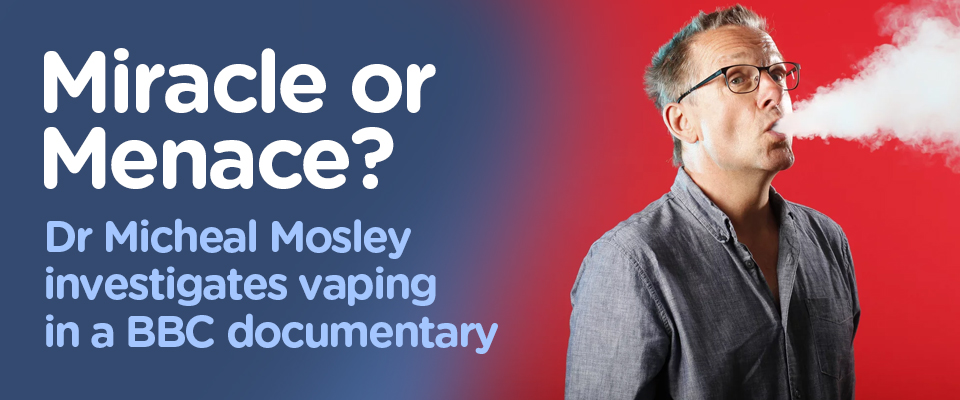It may seem hard to remember a time when e-cigarettes weren’t part of our lives (the lives of smokers wanting to give up, anyway). Nowadays, of course, you can’t walk too far in your neighbourhood without seeing people puffing away on their e-cigs.
Various bodies of research have been undertaken into vaping and e-cigarettes. Many of them indicate that vaping is safer than smoking. After all, there are all kinds of nasty things in the average cigarette. The odds of dying from or suffering from lung cancer, heart disease and all kinds of other problems increases if you smoke, compared to those who don’t.
So if vaping is better for you, doesn’t it make sense to switch?
Who is Michael Mosley?
We mentioned Michael Mosley in the title of this piece, but we should really refer to him as Dr Michael Mosley. He’s been through medical school and today he is a scientist and also a familiar figure on television. He’s now looked into the topic of vaping in order to make a documentary for BBC’s Horizon programme. This was last shown on 26th May under the title E-Cigarettes: Miracle or Menace? It’s a dramatic title, but what did the programme discover?
Better than smoking?
Recently, independent experts confirmed their belief that e-cigarettes are much safer – 95% less harmful, to be exact – than regular smoking. Interestingly enough, the documentary seemed to confirm that vaping is safer.
Dr Mosley has never smoked before, so he made the ideal subject to start vaping to see what happened. His lungs wouldn’t have been exposed to cigarette smoke, so it would be easier to see whether vaping had any effect on him at all. He reported that he vaped heavily for an entire month, and then looked at the results. He said his lungs did develop some inflammation, but crucially, when he stopped vaping, this inflammation disappeared – and quickly.
Now you might say this is evidence that vaping is bad for you. Yet consider what happened in one experiment conducted by American researchers. They decided to take some human cells and expose them to vapour from e-cigs. This was done over a couple of months. During that time, DNA damage was seen to occur to some of those cells. This was then reported to the wider public.
However, another element of that same experiment was not reported. During the same period of time, the researchers also exposed some of the human cells to cigarette smoke. Every single cell in that part of the experiment died – in less than a single day.
It’s known that non-smokers aren’t attracted to vaping. Only smokers use vaping as an alternative to smoking, and typically as a way to quit smoking for good. Some eventually quit vaping as well. It has been found to be very effective in this way. And as Dr Mosley found out, while it can cause mild inflammation of the lungs, this is by far the better option when compared to the serious damage smoking can do every time you pick up a cigarette and smoke it.
To this end, vaping really does seem to be by far the lesser of two evils. In fact, as far as smokers are concerned, vaping should not be viewed as evil at all. After all, nicotine patches aren’t viewed as evil. Yet they do contain nicotine in order to help wean people off the cigarettes they want to quit.
What’s your opinion on this? Do you think vaping is safe? Have you switched and noticed improvements to your health as a result? Sound off in the comments!
